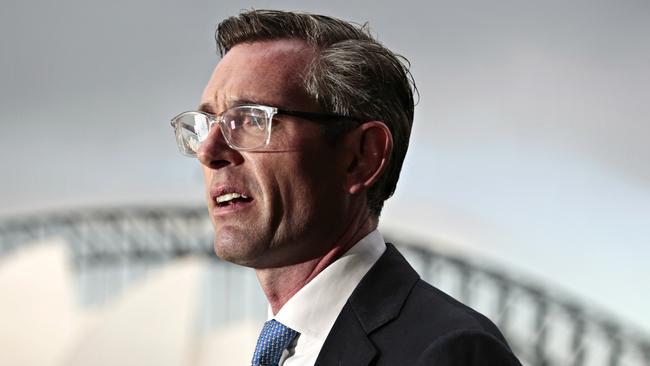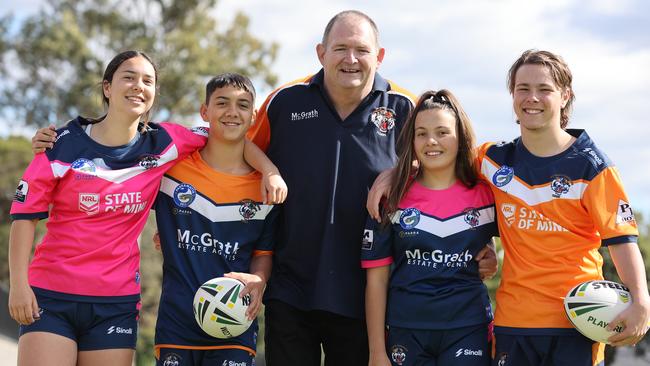$130m suicide prevention training for coaches, teachers and parents
Sporting coaches, parents and high school teachers will be given suicide prevention training as part of a $130m state government initiative to tackle a rise in self-harm cases and suicides.
NSW
Don't miss out on the headlines from NSW. Followed categories will be added to My News.
Sporting coaches, high school teachers and parents will be offered suicide prevention training as part of a $130 million state government mental health package to tackle a rise in self-harm cases.
The training blitz will be delivered over two years to 275,000 people at Catholic, independent and government schools, targeting peer leaders, teachers and support staff along with parents and youth influencers such as sports coaches and club managers.
Postgraduate psychology, social work and occupational therapy students will also be funded to undertake placements at Headspace centres in a move to significantly bolster the number of face-to-face and phone consultations.
Describing the package as the biggest single investment in mental health since the pandemic began, Premier Dominic Perrottet said the lockdown combined with working from home and home schooling has seen a record number of people reach out to crisis lines.
“This funding means that parents, children and the most vulnerable in our community can get the help they need now,” he said.
“As we navigate the economic recovery from this pandemic we must also support people’s mental wellbeing along the way.”

The latest figures form NSW Health show there have been 522 suspected or confirmed suicide deaths reported in NSW from January 1 to July 31 — slightly up from 504 in 2019.
However, calls to helplines have soared during the pandemic with Lifeline recording its highest daily calls on record.
Dr Angelo Virgona, who is the NSW branch chair of the Royal Australian and New Zealand College of Psychiatrists, said the funding was a game-changer in addressing the workforce shortage in mental health.
The move to direct postgraduate students to centres would significantly bolster capacity, especially in regional areas where they could be drawn from the local universities, he said.
“There is workforce shortage in mental health in Australia — nearly every psychiatrist has a waiting list. Some are so full they’ve closed their books to new clients,” he said.
“We know that an enthusiastic smart trainee who is really well-supervised delivers the same quality of care as a more experienced clinician. This will pay for the clinical supervisors which will allow Headspace to access well over 300 students.
“The funding will also dramatically increase the number of psychiatry sessions Headspace can offer. Most don’t offer psychiatry time so this will greatly improve the ability for people to get a diagnostic assessment early on in their journey.”

In more remote areas, Dr Virgona, who has worked at Headspace, said he envisaged centres being able to pay for the transportation costs of psychiatrists or clinical educations to access regional centres.
Dr Virgona said the funding was a positive step in meeting the demand after years of underfunding.
Mental health trainee provider Living Works has been chosen to offer its suicide prevention course to sports coaches, public and private high school teachers, parents and youth influencers as part of a $14 million initiative.
Living Works CEO Shayne Connell said those taking part will have the option of a 90-minute interactive course or a half-day face-to-face session with participants taught how to identify the signs of someone having suicidal thoughts — along with what to do in that case.
“There are a lot of mental health training courses around but we teach people how to ask if someone is suicidal and what to actually do,” he said.
“They will learn how to recognise if someone is having suicidal thoughts and how to enact a safety plan.”
Mr Connell, who joined the organisation after the tragic suicide of his uncle, said many people did not know how to ask someone if they were having suicidal thoughts.
Mental Health Minister Bronnie Taylor said the training blitz would enable thousands more people to be proactive in helping prevent incidents of self-harm.
“We know that more than 50 people who will attempt suicide will have not accessed a health services,” she said.
“That’s why were launching a statewide community training blitz to train sports coaches, teachers, community leaders who are at the frontline and are able to intervene.
“All it takes is one intervention to change the trajectory.”
Among those welcoming the additional suicide prevention training include All Saints Toongabbie Tigers Rugby League Club president Daryn Wilson who five years ago lost a volunteer coach to suicide.
Mr Wilson has since been running the NRL State of Mind mental health program at the club, with a weekend dedicated to mental health discussions and drill each year.
“When something like that happens close to you, it spurs you into action,” Mr Wilson said.
“We were the second club to sign up to the NRL program. Coaches are at the frontline and some kids may prefer to talk about what they’re going through in a friendly atmosphere like during a game of footy.
“We don’t always know what is going on at home, or what their background is. Some kids may simply appear stand-offish. If we can teach people how to look for the signs, that’s a good thing and the more people that do the course, the more people will be talking about it and passing on the message.”
Treasurer Matt Kean said the funding built on the record $2.6 billion allocated toward mental health at the last NSW Budget.
“Mental health issues often present after the crisis, so as we emerge from lockdown and life returns to normal, this funding will mean parents and children will have free access to help,” he said.
The package of measures will also include funding to pay for private beds for 12-24-year-olds experiencing complex trauma and eating disorders as part of a trial run by the South Western Sydney Local Health District.
Another $16.5 million over four years will also be spent on boosting staff numbers working with eating disorder patients, while the Butterfly Foundation will be funded to admit NSW residents into its national eating disorders centre at Wandi Nerida in Queensland.
The package also includes $21 million to be spent over four years to link Aboriginal Australians to culturally-appropriate mental health and suicide prevention services.
Caseworkers and casework managers working in child protection will also benefit from funding for trauma support, while $5 million will be spent over two years to fund a grants program for local community wellbeing events.
Got a news tip? Email weekendtele@news.com.au





